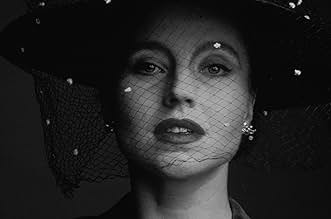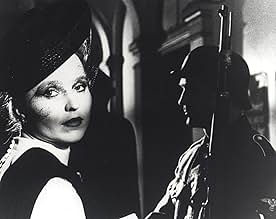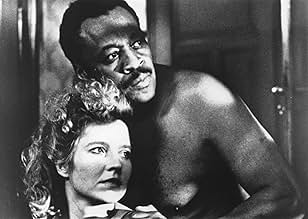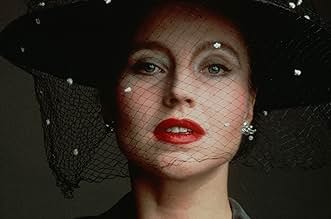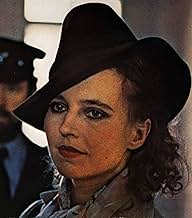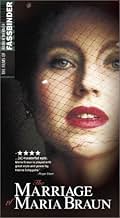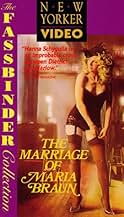NOTE IMDb
7,7/10
16 k
MA NOTE
Une veuve de la Seconde Guerre mondiale tente de s'adapter à la vie dans l'Allemagne d'après-guerre.Une veuve de la Seconde Guerre mondiale tente de s'adapter à la vie dans l'Allemagne d'après-guerre.Une veuve de la Seconde Guerre mondiale tente de s'adapter à la vie dans l'Allemagne d'après-guerre.
- Réalisation
- Scénario
- Casting principal
- Récompenses
- 13 victoires et 7 nominations au total
George Eagles
- Bill
- (as George Byrd)
Günter Lamprecht
- Hans Wetzel
- (as Günther Lamprecht)
Avis à la une
Maria Braun got married right in the middle of combat all around her and her husband Hermann. An explosion ripped through the building, to begin with, and she and Hermann had to sign the papers on a pile of rubble on the street. Perhaps this may strike some as a heavy-handed metaphor for what's about to come: marriage on the rocks, so to speak. It's a betrothal where the husband goes off to war and is held in a Russian prison camp, unbenownst to the helpless but hopeful and proud Maria, who keeps standing by the depressing rubble of the train station as some come home, others don't, with a sign awaiting Hermann.
Trouble arises, as happens in Rainer Werner Fassbinder's melodramas, and as its one of his best and most provocative, we see as Maria (uncommonly gorgeous Hanna Schygulla in this role) will do a two-face: she'll stand by her man, even if it means working at a bar for American GI's and, even still after she hears from a fellow soldier that Hermann has died will still stand by him as she sleeps with a black GI and comes close to bearing his child (that is, naturally, until he reappears and a murder occurs and he takes the rap so she can be safe), or working for a German businessman (effectively sympathetic Ivan Desny) and becoming his sometimes mistress and rising star in the company. Maria will do whatever it takes to be successful, but she'll always be married.
It's hard to say there's anything about Maria that isn't fascinating. Money, sex, power, all of these become interchangeable for Maria. She's like the feminist that has her cake and eats it with a sultry smile: she gets to have a husband, more or less (actually a lot less until the last ten minutes of the film) while obtaining things- a man who dotes on her whenever he can, a new and expensive house with servants, a secretary, money- that others around her aren't getting due to already being with a man or too weak in a position to rise anywhere (such as the secretary, played interestingly enough by Fassbinder's own mother).
Maria is sexy, confident, and all alone, with an idealized life going against a life that should be made in the shade. She says of the two men- the American soldier and poor old and sick Oswald- that she's fond of them, and at the same time will stick by those roses the confused and soul-searching husband Hermann sends from Canada, after being released from prison. She's casts a profile that a feminist would love to trounce, but understand where she's coming from and going all the way.
Fassbinder employs this inherent contradiction, and moments with Maria appear to go against the conventions of a melodrama (for example, Hermann walking in on the jubilant and half-naked Maria and GI is just about a masterpiece of a scene, with Maria's reaction not of surprise or guilt but pure happiness to see that he's there let alone alive), while sticking to his guns as a director of such high-minded technique with a storyline that should be predictable. But it isn't really. It's like one big metaphor for a country that, after the war, couldn't really move on to normalcy. A few times Fassbinder puts sound of the radio on in the background, and we see Maria walking around her family house, hustle and bustle going on around her, and the radio speaks of a divided Germany, of things still very unsettled, of a disarray. Maybe the only way to cope is excess, or maybe that's just my interpretation of it.
It's hard to tell, really, under Schygulla's stare face and eyes, anyway. It's such an incredible performance, really, one of those showstoppers that captures the glamor and allure of an old-time Hollywood female star while with the down-and-dirty ethic of a girl of the streets. Most telling are the opposing costumes one sees in one scene when she finally is with her husband, where she stars in one of those super-lustful black lingerie pieces and high heels, and then moves on to a dress without even thinking about it. That's almost the essence of what Maria is, and Schygulla wonderfully gets it down, a headstrong but somehow loving figure who is adored and perplexed by the men around her, sometimes in a single sentence. This is what Fassbinder captures in his wonderful first part of his "trilogy"; while I might overall prefer Veronika Voss as a masterpiece, Maria Braun is perhaps just as good as a character study, of what makes a woman tick and tock with (almost) nothing to lose.
Trouble arises, as happens in Rainer Werner Fassbinder's melodramas, and as its one of his best and most provocative, we see as Maria (uncommonly gorgeous Hanna Schygulla in this role) will do a two-face: she'll stand by her man, even if it means working at a bar for American GI's and, even still after she hears from a fellow soldier that Hermann has died will still stand by him as she sleeps with a black GI and comes close to bearing his child (that is, naturally, until he reappears and a murder occurs and he takes the rap so she can be safe), or working for a German businessman (effectively sympathetic Ivan Desny) and becoming his sometimes mistress and rising star in the company. Maria will do whatever it takes to be successful, but she'll always be married.
It's hard to say there's anything about Maria that isn't fascinating. Money, sex, power, all of these become interchangeable for Maria. She's like the feminist that has her cake and eats it with a sultry smile: she gets to have a husband, more or less (actually a lot less until the last ten minutes of the film) while obtaining things- a man who dotes on her whenever he can, a new and expensive house with servants, a secretary, money- that others around her aren't getting due to already being with a man or too weak in a position to rise anywhere (such as the secretary, played interestingly enough by Fassbinder's own mother).
Maria is sexy, confident, and all alone, with an idealized life going against a life that should be made in the shade. She says of the two men- the American soldier and poor old and sick Oswald- that she's fond of them, and at the same time will stick by those roses the confused and soul-searching husband Hermann sends from Canada, after being released from prison. She's casts a profile that a feminist would love to trounce, but understand where she's coming from and going all the way.
Fassbinder employs this inherent contradiction, and moments with Maria appear to go against the conventions of a melodrama (for example, Hermann walking in on the jubilant and half-naked Maria and GI is just about a masterpiece of a scene, with Maria's reaction not of surprise or guilt but pure happiness to see that he's there let alone alive), while sticking to his guns as a director of such high-minded technique with a storyline that should be predictable. But it isn't really. It's like one big metaphor for a country that, after the war, couldn't really move on to normalcy. A few times Fassbinder puts sound of the radio on in the background, and we see Maria walking around her family house, hustle and bustle going on around her, and the radio speaks of a divided Germany, of things still very unsettled, of a disarray. Maybe the only way to cope is excess, or maybe that's just my interpretation of it.
It's hard to tell, really, under Schygulla's stare face and eyes, anyway. It's such an incredible performance, really, one of those showstoppers that captures the glamor and allure of an old-time Hollywood female star while with the down-and-dirty ethic of a girl of the streets. Most telling are the opposing costumes one sees in one scene when she finally is with her husband, where she stars in one of those super-lustful black lingerie pieces and high heels, and then moves on to a dress without even thinking about it. That's almost the essence of what Maria is, and Schygulla wonderfully gets it down, a headstrong but somehow loving figure who is adored and perplexed by the men around her, sometimes in a single sentence. This is what Fassbinder captures in his wonderful first part of his "trilogy"; while I might overall prefer Veronika Voss as a masterpiece, Maria Braun is perhaps just as good as a character study, of what makes a woman tick and tock with (almost) nothing to lose.
Alright already, get over it, was Handke's comment to the 1968 meeting of the Gruppe 48 -- those writers who wanted to "heal" from the war. Well Fassbinder doesn't want to heal, he wants to indict. And this movie, probably his most accessible, takes a woman as the symbol for the nation-- a theme common to prehistoric oral literature, particularly among the Irish, made famous by Grimmelshausen's Mother Courage and updated by Brecht's play. But in this version, instead of the tragic Mother trying to save her children and mourning them, Maria Braun sells out for comfort from collaboration with the Nazi's through the economic wonder "Wirtschaftswunder" of the cold war. This was Fassbinder's big hit, because he toned down his politics both sexual and marxist, to focus on the loss of soul that Germany experienced. It was also Hanna Schygulla's Oscar worthy performance, probably one of her best of many great ones. Like little Oskar from the Tin Drum, Maria Braun was stunted by the experience, only on the inside.
First and best of Fassbinder's Post-WWII "Wirtschaftswunder" films. His lead character, a young woman, determined to emerge out of Germany's WWII ruins as a success, literally "walks over corpses" to get what she wants. Marrying a man doomed to be among the last to "fall" for the Fuehrer and the German Reich, Maria is now "Frau" instead of "Fraulein". Initially searching for her MIA husband, she eventually gives it up and moves on. Climbing the ladder, Maria Braun has her share of good times. Showering her impoverished family with lavish presents and lifting everyone's life-style up by a notch, Maria becomes the celebrated "Wunderkind" who gets whatever she wants. Although her uppity attitude isn't always popular, and there is plenty of talk about Maria (and her "ways"), Maria Braun laughs it all away. The Marlene Dietrich-like heroine always has the last laugh, as the shocking ending proves.
This is a Modern Classic, one of the very best films to come out of the 1970s/80s German Cinema. Much stronger than "Veronica Foss" and in the league of "Das Boot", "The Marriage of Maria Braun" is a product of Modern German Dramatic Cinema's golden age. No sugar coating, just pure, unadulterated truth as seen through the rear-view mirror of people who have lived the horrors and survived into new tomorrows. A true gem of a film!
This is a Modern Classic, one of the very best films to come out of the 1970s/80s German Cinema. Much stronger than "Veronica Foss" and in the league of "Das Boot", "The Marriage of Maria Braun" is a product of Modern German Dramatic Cinema's golden age. No sugar coating, just pure, unadulterated truth as seen through the rear-view mirror of people who have lived the horrors and survived into new tomorrows. A true gem of a film!
We watched this film in our German Cinema class at university some years ago, and I still remember it well.
Without wishing to give too much away, it tells the tale of a woman who, seeing the desolate landscape that Germany was in 1945, determines to build herself a comfortable life and, as she does so, she becomes one of many women in Germany rebuilding the nation. This was a time, historically, when the women were a greater driving force in the social and economic rebuilding of the nation than were the men (who were both lacking in credibility following the horrors and the mess of the years past, and somewhat dazed by what the nation had just been through).
As she builds that life (and in so doing helps to rebuild the nation), however, she finds that she may have sacrificed too much.
It is a movie worth watching in order to gain some understanding of what life was like in Germany from 1945 to roughly 1970. Rainer Fassbinder makes use of images in places which show the transition of German society from broken ruins to economic superpower, the changing status of women in German society over that time period, the changing attitudes both within Germany and from outside toward Germany, and the sacrifices that women were prepared to make in order to build the Germany that they ultimately did. It also asks, though, if the single-minded pursuit of rebuilding the nation economically and materially did not take too much out of the nation and the people in other areas.
I enjoyed the movie, and am happy to recommend it.
Without wishing to give too much away, it tells the tale of a woman who, seeing the desolate landscape that Germany was in 1945, determines to build herself a comfortable life and, as she does so, she becomes one of many women in Germany rebuilding the nation. This was a time, historically, when the women were a greater driving force in the social and economic rebuilding of the nation than were the men (who were both lacking in credibility following the horrors and the mess of the years past, and somewhat dazed by what the nation had just been through).
As she builds that life (and in so doing helps to rebuild the nation), however, she finds that she may have sacrificed too much.
It is a movie worth watching in order to gain some understanding of what life was like in Germany from 1945 to roughly 1970. Rainer Fassbinder makes use of images in places which show the transition of German society from broken ruins to economic superpower, the changing status of women in German society over that time period, the changing attitudes both within Germany and from outside toward Germany, and the sacrifices that women were prepared to make in order to build the Germany that they ultimately did. It also asks, though, if the single-minded pursuit of rebuilding the nation economically and materially did not take too much out of the nation and the people in other areas.
I enjoyed the movie, and am happy to recommend it.
Allegory for postwar Germany...examination of modernist female sexuality...Marxist critique of human labor under capitalism...yada, yada. I won't bore you with that prattle. Which isn't to say those idea weren't baked into the movie or that you're wrong to see the movie as deeply philosophical. But it certainly isn't necessary to enjoying the movie.
The Marriage of Maria Braun is a great film without needing to be dissected as some dull academic thesis paper. Maria depicted quite spectacularly by Hanna Schygulla, she plays a character who I can't really decide is tragic or the real "villain." This is one of those weird films where every character is so endearing and well written that it's painful to see things go so off the rails for them.
Ending was a little obvious, and I could argue it was too dumb for the rest of the movie, but overall an amazing production.
The Marriage of Maria Braun is a great film without needing to be dissected as some dull academic thesis paper. Maria depicted quite spectacularly by Hanna Schygulla, she plays a character who I can't really decide is tragic or the real "villain." This is one of those weird films where every character is so endearing and well written that it's painful to see things go so off the rails for them.
Ending was a little obvious, and I could argue it was too dumb for the rest of the movie, but overall an amazing production.
Le saviez-vous
- AnecdotesInspired by "Mutter Courage und ihre Kinder" (1938/39), a play by Bertolt Brecht, and Liliane (1933).
- GaffesAt the end of the cut of the two kids blowing up the firecrackers, they start laughing but no sound is heard. The sound of laughter is heard on the next cut after they get yelled at by the man scavenging for wood.
- Citations
Maria Braun: I'm a master of deceit: a capitalist tool by day, and by night an agent of the proletarian masses - the Mata Hari of the Economic Miracle.
- Crédits fousAt the very end of the credits the following persons are 'credited' by their picture: Konrad Adenauer, Ludwig Erhard, Kurt Georg Kiesinger and Helmut Schmidt and a disconnected phone line can be heard.
- Bandes originalesIn The Mood
Written by Wingy Manone, Andy Razaf and Joe Garland
Meilleurs choix
Connectez-vous pour évaluer et suivre la liste de favoris afin de recevoir des recommandations personnalisées
- How long is The Marriage of Maria Braun?Alimenté par Alexa
Détails
- Date de sortie
- Pays d’origine
- Sites officiels
- Langues
- Aussi connu sous le nom de
- The Marriage of Maria Braun
- Lieux de tournage
- Sociétés de production
- Voir plus de crédits d'entreprise sur IMDbPro
Box-office
- Budget
- 1 975 000 DEM (estimé)
- Montant brut aux États-Unis et au Canada
- 8 144 $US
- Week-end de sortie aux États-Unis et au Canada
- 11 623 $US
- 16 févr. 2003
- Montant brut mondial
- 11 869 $US
Contribuer à cette page
Suggérer une modification ou ajouter du contenu manquant

Lacune principale
By what name was Le mariage de Maria Braun (1979) officially released in India in English?
Répondre

